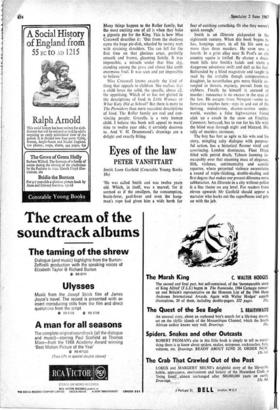Eyes of the law
PETER VANSITTART
'He was called Smith and was twelve years old. Which, in itself, was a marvel; for it seemed as if the smallpox, the consumption, brain-fever, gaol-fever and even the hang- man's rope had given him a wide berth for fear of catching something. Or else they weren't quick enough.'
Smith is an illiterate pickpocket in the eighteenth century. When this book begins he has, hangings apart, in all his life seen no more than three murders. He soon sees a fourth. In a grim alley near St Paul's an old country squire is knifed. By chance a docu- ment falls into Smith's hands and starts a dangerous adventure swift and deft as his feet. Befriended by a blind magistrate and taught to read by the irritable though compassionate daughter, he nevertheless gets more thickly en- tangled in threats, mystery, pursuit from the stabbers. Finally he himself is accused of murder: innocence is no excuse in the eyes of the law. He escapes from Newgate—some in- formative touches here—nips in and out of the thriving, malodorous, disease-snotten under- world, watches a false highwayman friend stick up a coach in the snow on Finchley Common; betrayed, has to run for his life with the blind man through night and blizzard. His tally of murders increases.
The boy has feet as agile as his wits and his story, mingling salty dialogue with purpose- ful action, has a historical flavour vivid and convincing. London dominates, Fleet Ditch filled with putrid death, Tyburn looming in- escapably over that steaming mass of elegance, filth, violence, sentimentality and caustic repartee, where perpetual violence necessitates a round of triple-thinking, double-dealing and first degree that makes our present dilemma seem sabbatarian. An illiterate in a city without police is a fine theme on any level. For readers from eleven upwards Mr Garfield should appear a narrator who hacks out the superfluous and gets on with the job.


































 Previous page
Previous page